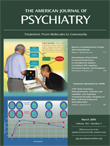DRD2 Promoter Region Variation as a Predictor of Sustained Response to Antipsychotic Medication in First-Episode Schizophrenia Patients
Abstract
OBJECTIVE: All antipsychotics act on the dopamine D2 receptor. The present study extends prior pharmacogenetic investigations of the D2 receptor gene (DRD2) by examining, in first-episode schizophrenia patients, promoter region variation as a predictor of response time to two first-line atypical antipsychotics. METHOD: Patients experiencing their first episode of schizophrenia (N=61) were genotyped for two DRD2 promoter region polymorphisms (A-241G and –141C Ins/Del) and were randomly assigned to receive 16 weeks of treatment with either risperidone or olanzapine. Time until sustained response (two consecutive ratings without significant positive symptoms) for rare allele carriers versus wild types was examined by using Kaplan-Meier curves. RESULTS: Relative to wild type homozygotes, G carriers (A–241G) exhibited a significantly faster time until response, whereas –141C Del carriers took a significantly longer time to respond. Diplotype analysis revealed similar results. CONCLUSIONS: These findings suggest that variation in the D2 receptor gene can, in part, explain variation in the timing of clinical response to antipsychotics in patients with first-episode schizophrenia.



